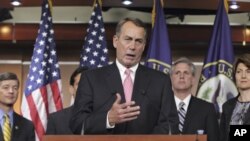Here in Washington, seemingly all eyes are on the U.S. House of Representatives, which is set to hold a decisive vote on raising the country’s debt ceiling, just one day ahead of a potential default on the national debt. With the vote expected soon, it is still not clear whether House Speaker John Boehner has the 216 votes needed to pass the measure and send it to the Senate.
Analysts say a debt deal hammered out late Sunday between President Barack Obama and congressional leaders to raise the debt ceiling and cut government spending is likely to pass the Senate, but the outcome in the House of Representatives is uncertain.
|
U.S. Debt Deal Facts
|
One of the main problems appears to be with House Democrats, many of whom say the president has compromised too much and agreed to painful cuts in government programs for the country’s poor, disabled and most vulnerable in order to win the support of conservative and libertarian Tea Party Republicans. Vice President Joe Biden came to Capitol Hill and met with fellow Democrats in Congress for 90 minutes to try to win support for the debt deal.
The leader of the House Progressive Caucus in the Democratic caucus, Representative Keith Ellison, says he is unconvinced and that many in his caucus will vote “No.” “Republicans have sought to dismantle basic sources for average working Americans, while spending more to support millionaires and corporations. Tea Party Republicans have held our economy hostage to those demands. But deficit reductions should not be enacted in a hostage situation," he said.
On the other side of the aisle, several Republican members of the House Armed Services Committee expressed concern about potential cuts in defense spending.
At a news conference, House Speaker John Boehner and Republican House leaders praised the debt agreement as a first step toward fundamentally changing Washington’s spending habits. But asked whether he had the votes to pass it in the House of Representatives, Boehner said other congressional leaders, likely referring in particular to Democratic House Minority Leader Nancy Pelosi, are also responsible for delivering votes to get the measure through the House.
Watch a Related Report by Laurel Bowman:
“While I would remind all of you that this is not just an agreement between the president and myself, this is an agreement between the bipartisan leaders of the Congress, and the president of the United States. And all the leaders have a responsibility because they have all signed off on the agreement to bring sufficient votes to make sure that it passes," he said.
Apart from dueling news conferences, there was a rare and raucous protest in the House chamber. About 25 members of a group called the National Peoples Action chanted that Boehner should stop favoring corporations and unfurled a banner in the House gallery. They were removed and arrested after continuing to yell and chant in the corridors of the Capitol.
The bill up for a vote would raise the U.S. debt ceiling by more than $2 trillion, enough to assure the federal government’s solvency through next year’s national elections, something the president insisted on. It also provides for two rounds of spending cuts. The U.S. national debt stands at $14.3 trillion. If the House passes the bill, it will move to the Senate for a vote. If it passes there, it would then go to President Obama for his signature.











